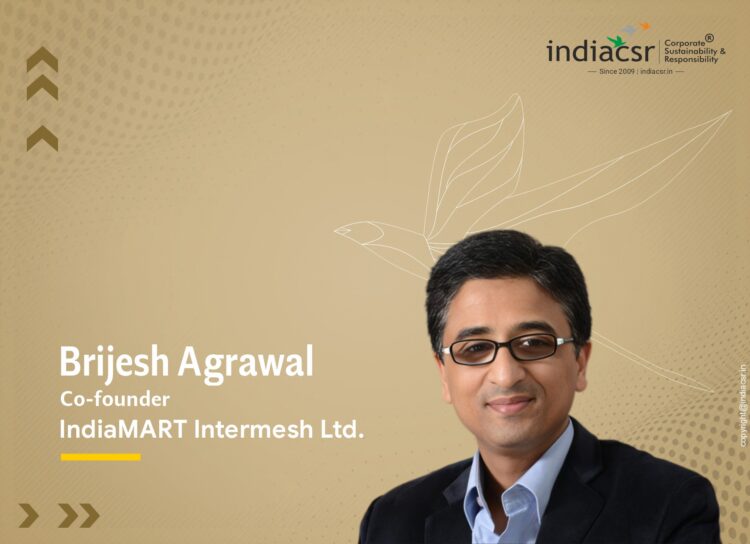
By Rusen Kumar
NEW DELHI (India CSR): In this exclusive interview, Rusen Kumar, Managing Editor, India CSR, speaks with Brijesh Agarwal, Co-Founder of IndiaMART InterMESH Limited, about the company’s long-term commitment to strengthening education and livelihood pathways for underserved communities across India. With a CSR investment of Rs 58.62 million in FY 2024–25, IndiaMART continues to advance its mission of “Leaving No Dreams Behind,” with a strong focus on improving school infrastructure, enhancing digital learning outcomes, and nurturing entrepreneurial mindsets among youth.
Brijesh explains how IndiaMART’s childhood-to-livelihood approach addresses systemic challenges by improving basic school facilities such as classrooms, sanitation, furniture, and safe drinking water—ensuring that children not only attend school, but stay, learn, and grow with dignity. Through impactful collaborations with organisations such as Khan Academy India and Udhyam Learning Foundation, the company is enabling digital access, developing regional-language academic content, and cultivating entrepreneurial confidence among nearly 900,000 students across government schools.
Emphasizing gender inclusion, community participation, and measurable impact, IndiaMART continues to build sustainable educational ecosystems—one student, one school, one district at a time.
Q 1. IndiaMART invested Rs 58.62 million in CSR in FY 2024–25. Could you highlight the key focus areas and why they were chosen?
At a time when the world is moving towards digital classrooms and smart education, lakhs of children in remote areas are still struggling with basic needs such as a roof to study under, chairs & desks, clean drinking water and proper sanitation. Under our CSR Vision, we are determined to restore the right to dream, one district at a time.
With the mission – ‘Leaving No Dreams Behind’, our focus includes enabling sustainable socio-economic development with a strong emphasis on education, skill development, and rural school infrastructure. Our partnership with impactful organisations such as Khan Academy, Udhyam learning foundation has enabled us to drive this transformation. We are also advancing SDG 4 (Quality Education), specifically Target 4.A, which calls for building and upgrading inclusive and safe schools for every child under our vision. We continue to scale it to ensure every child has access to basic amenities to complete their primary education.
Q 2. Education is central to IndiaMART’s CSR vision. What makes the “childhood to livelihood” approach unique in addressing India’s learning and skill gaps?
We believe that true transformation starts with empowerment, and education is a powerful enabler of this transformation. Especially for a child, the journey from childhood to livelihood becomes easy if the foundation is strong. That is why our efforts have always been focused on getting every kid, especially from underprivileged backgrounds, to benefit from formal education at schools.
To bring this change, we are working on three pillars – building infrastructure, improving the quality of education, and building entrepreneurship development as an inclusive part of the education system. Better infrastructure motivates children to enter the premises, quality of education enriches their learning and provides a strong foundation for them, and an entrepreneurial spirit opens up opportunities for livelihood. We will continue our journey of one student, one school, one district, and add to the brighter future in every possible way.
Q 3. Could you share examples of tangible impact from IndiaMART’s school infrastructure upgrades in rural areas?
IndiaMART’s investments in rebuilding and upgrading school infrastructure have delivered tangible, measurable improvements in the communities we serve. These changes go beyond physical infrastructure, influencing education outcomes, gender inclusion, and community development. Some of the significant changes that our endeavors have contributed to include improved student attendance and retention, improved participation of female students in education, safer learning environments, and nurturing the spirit of entrepreneurship. For instance, we renovated and built classrooms in Sadat Inter College, where the total enrollment before the intervention was ~300 students. The same has now crossed 1,000 students. In another effort, our infrastructure programs led to an average 2x increase in enrollment in Bahraich, UP, as well as MM Hills, Karnataka.
Q 4. How have partnerships with Khan Academy India and Udhyam Learning Foundation enhanced digital learning and entrepreneurship for students?
Our partnerships with Khan Academy India and Udhyam extend our impact beyond infrastructure, ensuring that children and youth have the knowledge, skills, and confidence to succeed. All programs are digitally enabled, in line with our core mission of driving digital empowerment. By connecting education directly to employability and entrepreneurship, these initiatives foster sustainable socio-economic change. We also support Khan Academy India in developing regional language educational content for Maths and Science. Last year, this partnership benefited approximately 80,000 students across 746 Kasturba Gandhi Balika Vidyalayas (KGBVs). This year, we are further extending this partnership to work with 95 UP Social Welfare schools, reaching close to 20,000 students, developing Science (Gr 9-12) content in Hindi, adapted to the UP-SCERT curriculum. In collaboration with Udhyam, IndiaMART is nurturing entrepreneurial mindsets among over 900,000 government school students, equipping them to thrive in a dynamic future.
Q 5. Gender inclusivity and women’s empowerment are part of IndiaMART’s CSR strategy. How are these priorities implemented on the ground?
As we go deeper into the country, gender disparity is much more evident. Lower enrollment of girl children in school, high dropout rates and decreased attendance due to lack of basic facilities such as separate toilets for females. These barriers continue to increase as the children mature, making the journey of a girl even more difficult.
At IndiaMART, gender inclusivity is woven into our social impact and business growth strategy. Our CSR policy also focuses on empowering women through supporting educational opportunities for girls, and adopting measures to reduce inequalities faced by socially and economically marginalized groups. So far, we have provided 600 desks to Seemapuri Girls School, positively benefiting over 1,300 girl students. The SMART program by Tech Mahindra has emerged as a powerful platform for skill development, with women comprising 62% of its participants, and we continue to do more each day.
Q 6. How do SMART Centres support youth employability, and what measurable outcomes have you seen so far?
SMART Centres play a vital role in bridging the gap between education and employability, preparing young learners, especially from underserved communities, for meaningful participation in the job market. These centres are designed to equip youth with practical skills, digital literacy, and entrepreneurial capabilities, ensuring they are ready to meet the demands of India’s evolving economy.
The centres provide comprehensive vocational training, practical exposure, and industry-relevant skills. In addition, they offer career guidance, resume building, interview preparation, and soft skills training, enabling learners to confidently enter the workforce.
Q 7. Looking ahead, what new CSR initiatives or expansions can we expect from IndiaMART in the coming years?
We plan to scale our infrastructure development projects in schools located in Bahraich, Uttar Pradesh, enhancing learning environments for marginalized communities. One of the other key initiatives under consideration is a collaboration with Khan Academy India to develop regional content for Social Welfare schools, which primarily serve underprivileged students from SC, ST, and EWS backgrounds in classes 6 to 12. We are also exploring further expansion of Udhyam’s Entrepreneurship program across more districts in Uttar Pradesh to create a long-term impact.
About Rusen Kumar
Rusen Kumar is a distinguished journalist, author, and visionary knowledge entrepreneur specializing in Corporate Social Responsibility (CSR) and sustainability in India. He is the founder and managing editor of India CSR Network, a leading platform dedicated to CSR and sustainability issues.
(Copyright@IndiaCSR)
Showcase your CSR achievements and share your insights with India’s leading CSR platform.
Contact us at biz@indiacsr.in I 9981099555 to feature your success stories and interviews.







